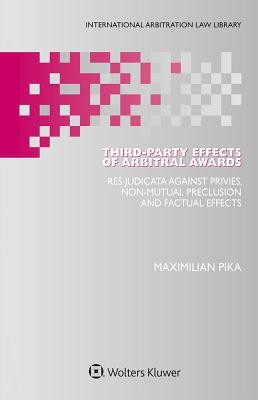
- Išsiųsime per 10–14 d.d.
- Autorius: Maximilian Pika
- Leidėjas: Kluwer Law International
- ISBN-10: 9403512733
- ISBN-13: 9789403512730
- Formatas: 16 x 24.9 x 2.5 cm, kieti viršeliai
- Kalba: Anglų
- Extra -15 % nuolaida šiai knygai su kodu: ENG15
Atsiliepimai
Aprašymas
The specialization and financial demand of global business render international transactions inherently multilateral and thus best effected through arbitration agreements. However, it often happens that - for various reasons, such as a debtor's failure to pay damages ordered by an arbitral tribunal - third parties who did not consent to the original arbitration enter the scene. This is the first book to examine the binding effects of international commercial arbitral awards in follow-up disputes against third parties. It comprehensively analyses arbitral awards' third-party effects under national arbitration laws, the New York Convention and private international law. Moreover, it proposes solutions under transnational law before both courts and arbitral tribunals.
Applying a continuously comparative methodology that refers to specific statutory, jurisprudential and scholarly sources, this book explores the nature and implications of such aspects of third-party involvement as the following:
- the foundations of the doctrine of res judicata and its intrinsic connection to other tools of forum coordination;
- the distinction between res judicata before courts on the one hand and arbitral tribunals on the other;
- the application of non-mutual preclusion in favour of third parties;
- the potential for arbitral awards to constitute a fact in follow-up disputes;
- a comparison of rules and uncertainties on awards' third-party effects under various national arbitration acts;
- preclusion agreements;
- the arbitration agreement's scope; and
- judgments' third-party effects as a shift of the participatory burden.
For civil law, the author focuses on France and Switzerland (as predominant arbitral seats) and on Germany (as a Model Law example). Among common-law countries, he concentrates on England and Wales and on the United States. Statutory sources (with specific wording), leading cases and summaries of the most important scholarly discussions are all invoked.
With its clear guidelines for matters currently not addressed in previous publications and likely to be raised in specific cases, this book will prove to be of immeasurable value for arbitration practitioners and academics in any jurisdiction. Business parties that seek to prevent contradicting decisions in multilateral transactions will appreciate the practically feasible alternatives it presents in the event of follow-up disputes involving third parties.
EXTRA 15 % nuolaida
Kupono kodas: ENG15
Akcija baigiasi už 17:59:48
Nuolaidos kodas galioja perkant nuo 10 €. Nuolaidos nesumuojamos.

- Autorius: Maximilian Pika
- Leidėjas: Kluwer Law International
- ISBN-10: 9403512733
- ISBN-13: 9789403512730
- Formatas: 16 x 24.9 x 2.5 cm, kieti viršeliai
- Kalba: Anglų
The specialization and financial demand of global business render international transactions inherently multilateral and thus best effected through arbitration agreements. However, it often happens that - for various reasons, such as a debtor's failure to pay damages ordered by an arbitral tribunal - third parties who did not consent to the original arbitration enter the scene. This is the first book to examine the binding effects of international commercial arbitral awards in follow-up disputes against third parties. It comprehensively analyses arbitral awards' third-party effects under national arbitration laws, the New York Convention and private international law. Moreover, it proposes solutions under transnational law before both courts and arbitral tribunals.
Applying a continuously comparative methodology that refers to specific statutory, jurisprudential and scholarly sources, this book explores the nature and implications of such aspects of third-party involvement as the following:
- the foundations of the doctrine of res judicata and its intrinsic connection to other tools of forum coordination;
- the distinction between res judicata before courts on the one hand and arbitral tribunals on the other;
- the application of non-mutual preclusion in favour of third parties;
- the potential for arbitral awards to constitute a fact in follow-up disputes;
- a comparison of rules and uncertainties on awards' third-party effects under various national arbitration acts;
- preclusion agreements;
- the arbitration agreement's scope; and
- judgments' third-party effects as a shift of the participatory burden.
For civil law, the author focuses on France and Switzerland (as predominant arbitral seats) and on Germany (as a Model Law example). Among common-law countries, he concentrates on England and Wales and on the United States. Statutory sources (with specific wording), leading cases and summaries of the most important scholarly discussions are all invoked.
With its clear guidelines for matters currently not addressed in previous publications and likely to be raised in specific cases, this book will prove to be of immeasurable value for arbitration practitioners and academics in any jurisdiction. Business parties that seek to prevent contradicting decisions in multilateral transactions will appreciate the practically feasible alternatives it presents in the event of follow-up disputes involving third parties.





Atsiliepimai